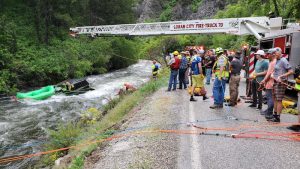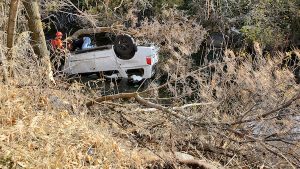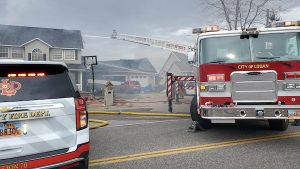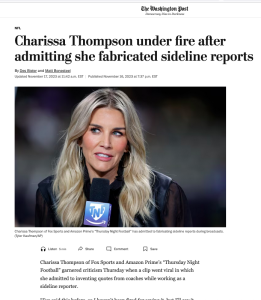15 Motivation and Ethics
Working in television news is hard. The pay is not much, the hours can be demanding and inflexible and you present your work in front of thousands of critics a day who think they can do your job better than you do. Ask a professional athlete what that’s like.

A team of first responders and former bystanders team up to rescue a family of five trapped in their van in the Logan River. Everyone got out OK in the emotional effort.
So why do it? Because it’s awesome. You get a front-row seat to history. The assignment desk never wraps up a phone call, slams down the receiver and screams, “there’s nothing happening downtown! Get down there now!” As a rule, you only go where the action is.
You don’t read about people with interesting stories, you meet them and tell their stories yourself. Those stories can change other peoples’ lives.

An A-TV student reporter interviews a USU student about her alleged sexual assault. The student won a $500,000 lawsuit.
You can make a difference by shining the light of truth into some very dark corners. What do you know about human trafficking or political corruption that you did not learn from a journalist?
You can share stories of inspiration and let your viewers feel good about the world. I did a photo essay on a postal worker who donated a kidney to a coworker he barely knew. Television let us meet both people and see what they’re like for ourselves.
Television can bring a level of emotion that can’t be matched. I reported on the funeral of a police K-9 that was shot and killed in the line of duty. I wasn’t sure what to make of it on my drive there, but things changed once the ceremony started. Officers take their K-9s home, and I saw and recorded a family grieving for a beloved companion they welcomed into their home. I interviewed an officer with his own K-9 who related with the loss so much that he was choked up. The dogs from neighboring agencies lined up as the casket went past, and I asked an officer if his dog knew what was going on, and he said it did. I kept my own emotions out of the story–it is hard to focus a camera when your eyes are tearing up–but was able to convey the event to viewers with natural sound and soundbites. https://www.fox13now.com/2017/07/15/memorial-service-honors-unified-police-k9-killed-in-the-line-of-duty
In World War II, the U.S. government rounded up Japanese Americans from the West Coast and sent them to internment camps. One of those camps, Topaz, was in an isolated area of Utah. I was sent to cover the opening of a museum there. Former internees, now 80-90 years old, were there to share their stories. These first-hand accounts were the first I had ever heard, and I heard them in person. I asked the questions. When I got back to edit, I chose what sound bites I could to convey their feelings, and put the rest on an 18-minute video. The station’s website now has a link to the extended interviews.

What about those vehicle crashes? When you can read the line, “the rider wasn’t wearing a helmet” or “the driver wasn’t wearing a seatbelt” in a fatal crash story hopefully someone watching will be nudged to take basic precautions.

When you report a house fire, the cause and the use/absence of smoke detectors could warn viewers not to make the same mistakes. Usually, a few well-publicized deaths lead people to action, and you can be the one publicizing. Often this type of story can be very sad, like interviewing the mother of a child who died from Sudden Infant Death Syndrome. The mother has probably agreed to the interview to spare some future mother the same grief. Although you are one interviewing her, having her relive the experience and its pain, you are giving her loss some value.
You can also point out fun things people wouldn’t otherwise know about. I’ve shot hundreds of these, including locally-made chocolate, a vintage bomber offering rides,

festivals, get-togethers and a magician’s Kickstarter project for Halloween giveaway magic tricks instead of candy.

Me and intern Daniel finishing up our first Saturday morning live shot for KUTV. It was at a gardening competition.
For a couple years, I did live shots for my station’s Saturday morning newscast. Since it was a Saturday, I tried to show people their options for the day: a museum opening, a parade, a fair, a race and even a rummage sale like no other. Yes, people saw the rummage sale on TV and came to shop.
Ethics
Sometimes there are tough decisions to make on the job: Do we show an innocent victim’s face? Do we knock on the door of a grieving family? Do we allow the sales department of our station to influence our news coverage? Legally you can do all of these, but that’s another course; these are ethical questions, and for these, we will refer to the Society of Professional Journalists’ Code of Ethics. Here are four basic tenets, taken straight from the SPJ website.

This case of an NFL sideline reporter possibly fabricating quotes has not been resolved as of this writing, but is not worth the questioning of one’s reputation.

For most situations, you can find one of the tenets that covers it. You won’t have a quandary a day or even one a week. Thankfully, it is rare to have to ask for ethical or legal advice. If you stick to the SPJ Code you can sleep at night even if someone on some side of an issue isn’t happy with your decision. SPJ.org has more ethical and legal resources for journalists. It is worth checking out and worth joining.

